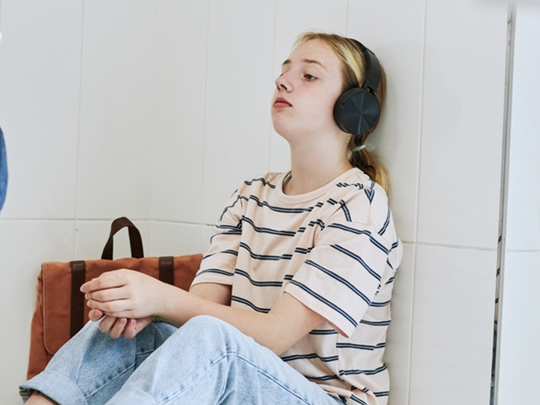With it being recognised by the Mental Health Foundation that around 20% of adolescents may experience a mental health problem in any given year, it is clear that mental health is a big challenge for young people.
Sadly, this figure is even more alarming for young people in foster care, with almost half of them living with a mental health condition. These statistics may leave you wondering why young people in foster care are so much more likely to experience poor mental health, and what you can do as a foster parent to support the emotional wellbeing of the young person in your care.
Let’s start by looking at the link between adverse childhood experiences and mental health outcomes…

Adverse Childhood Experiences and mental health
Children and young people who come into foster care have often survived some of the most harrowing experiences imaginable. Many have suffered abuse, neglect, or other adverse childhood experiences (also known as ‘ACEs’). Plus, the experience of coming into foster care can also be incredibly frightening for young people, and there will likely be a great sense of sadness and loss in those early days.
All these early experiences can profoundly impact how a child’s brain develops and functions, and how their body responds to stress. Without the right support, they can make young people in care more susceptible to long-term mental health difficulties such as anxiety and depression. Some young people may even begin to self-harm or develop an eating disorder to manage these emotions.
A national survey conducted by the World Health Organisation (WHO) found a strong correlation between childhood adversity and adult mental wellbeing. Almost half of the adults living with mental ill-health had been exposed to at least one adverse childhood experience, and the more ACEs a person experienced, the lower their mental wellbeing in adulthood.
Supporting the emotional needs of the young person in your care
Every young person you foster will be different, and many will need a specialist therapeutic foster care plan tailored specifically to their needs. So while we’re unable to offer specific advice for the young person in your care, there are many things you can do to promote their emotional wellbeing.
The following guidance is designed to complement any specific therapeutic advice you’ve received from the team working around your young person to promote their emotional wellbeing. As always, if you have any concerns about the mental health of your young person, you should always seek advice from your GP and local fostering team.

1. Encourage them to share their feelings
This will vary from teen to teen of course, but find a way to check in with them and build their confidence in you, that you are there for them and want to hear what they are thinking and how they are feeling. Whether this is through a shared daily task, hobby or just some simple words of encouragement to help build this rapport.
Find ways to demonstrate that you are here to listen to them, and respond with compassion when they are ready to share. Remember, you shouldn’t try to ‘fix’ their feelings, nor demand that they ‘fix’ them either.
It is important to acknowledge their emotions when your teen is opening up to you – as we know, our young people have often been through trauma, and it can be uncomfortable to hear that someone you care for has survived trauma and is struggling. However, if you can simply stay with them and demonstrate that you are trying to understand, this will go a long way in helping them trust and build a relationship with you as their foster parent.
2. Celebrate them
It is human nature to notice problems and frustrations, but it is just as important to notice and celebrate your teen for their strengths as well. Even something that might not seem like a big deal to you could be a real achievement for them, so validation of this success is vital. Approach this sensitively. How does your young person like to celebrate and receive recognition?
3. Support them
As a foster parent to a teenager it can sometimes be difficult to feel like you can allow the perhaps desired independence that comes with adolescence, but striking the balance of support and space will reap rewards. Find a way to work together to set up some balanced routines with achievable goals – and share their joy in meeting these together.
4. Manage conflict together
Everyone gets stressed and has bad days, but for some of the children in care, this might have been a cause of their previous trauma, so staying as calm as you can is key. If there is conflict, firstly help to bring them back down to a state of calm – remember, they won’t have access to the thinking/feeling part of the brain if they’re in fight/flight/freeze/collapse. You could try some of these grounding activities. Pay attention to your own emotional regulation too, and seek support if needed. If something goes wrong, similarly attend to repairing the rupture once everyone has had the space to regain a sense of relative calm – don’t leave it to fester.
Once grounded, you can begin to work through the conflict. Be honest and transparent with your teen – you are teaching them through your example, how to resolve and work through conflict in a grown-up way. Talking through how you are dealing with difficult feelings can help them to understand their feelings are okay, and help them process their own thoughts. Discuss reflections and how you can come to a resolution together so that they feel included in the outcome.
5. Demonstrate listening
Often a teenager, even one not in foster care, will be in the process of exploring and testing their place and identity so conflict can often be born from this. Listen to what they are saying to you both in the good and more challenging times, as hearing this struggle and supporting them to navigate it in a calm and transparent manner will help. Tentatively checking your understanding of what you are hearing with them demonstrates you’re listening. Reflect back on what you think they might be feeling, thinking and wanting to do.
Bonus tip: Check in with yourself
As a foster parent to a teen living with a mental health condition, you will be very focused on looking after them, but you need to make sure you are looking after yourself as well. Self-care shouldn’t be a luxury, reserved only for when you ‘have time’. Instead, it should be part of everyday life – however, big or small.
It takes commitment and persistence to make it work, and small acts of self-kindness completed regularly work best to keep us on an even keel. Plus, this is also great modelling of self-compassionate behaviour that your young person can learn from.
Here are some simple ideas for self-care:
- Make a cup of tea, sit down, relax, and enjoy it while it’s hot!
- Read a chapter of a book
- Call a close friend for a catch up
- Watch a funny video on YouTube – laughter is a great form of self-care
- Pop your favourite music or podcast on, and go for a walk by yourself
- Go to bed a little earlier than normal for those all-important zzz’s






